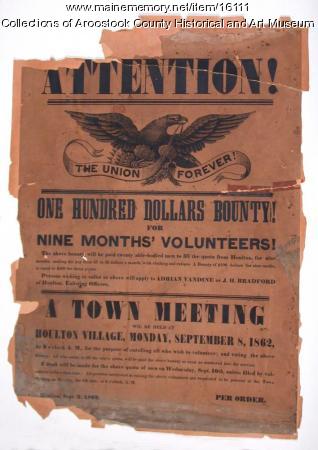 |
| Bounty Notice (MaineMemory.net) |
WAR DEPARTMENT, Washington City, January 4, 1864.
To His Excellency the President of the United States:
MR. PRESIDENT: I beg to submit to your consideration the accompanying letter of the Provost-Marshal-General in respect to the provision of the joint resolution of Congress of December 23, 1863, relating to the payment of bounties. No one seems to doubt the necessity of increasing the military force for the speedy termination of the rebellion; and although much difference of opinion exists in respect to the merits of the system of raising troops by volunteers, and the payment of bounties, and the system of raising and adequate force by draft, yet two things are certain-
First. That, whatever may be the weight of argument or the influence of individual opinion, a large portion of the people in every State prefer the method of contributing their proportion of the military force by bounty to volunteers rather than by draft.
Second. That veteran soldiers who have become inured to service, even when paid bounty, constitute a more capable force than raw recruits or drafted men without bounty.
The information received by this Department from the armies in the field prior to the passage of the resolution referred to indicated that a very large proportion of the forces now in service would have cheerfully re-enlisted for three years under the terms authorized by the order of this Department, and that such enlistments have been checked, and will, in great measure, be put an end to by the restriction imposed by the action of Congress. It is believed, that if any limitation should be imposed upon the payment of bounties to encourage the enlistment of the veteran forces now in the field, it ought not to be sooner than the 1st of February. It is respectfully submitted to your consideration, therefore, whether the attention of Congress might not again well be called to the subject, so that the restriction may be reconsidered.
I have the honor to be, very respectfully, your obedient servant,
EDWIN M. STANTON,
Secretary of War.
[Sub-inclosure.]
Hon. E. M. STANTON,
Secretary of War:
SIR: After great labor the volunteer recruiting service under the President's call of October 17 is fairly in progress. Letters, all dated between the 20th and 24th of December, from the superintendents of recruiting service in sixteen States are, in the main, very encouraging as to the prospect of getting a large number of recruits by volunteer enlistments. Several of the State were in a fair way to raise the quotas assigned them. The act approved December 23, 1863, forbidding, after January 5, the payment to volunteers of all bounties except $100, authorized by the act of 1861, was not known at the time these favorable reports were made to me. I have no doubt the effect of that act will be to check, if it does not shop, enlistments. Of the $100 bounty provided by act of 1861, but $25 can be paid in advance, $75 being due only after two years" service.
It took some time after October 17 to get the people aroused to the subject of volunteering; they are now in most States earnestly engaged in it, and I have reports for October, November, and part of December, showing that 42,529 men have been enlisted, and the daily average of enlistments is increasing. Under these circumstances I respectfully suggest the property of a reconsideration of the act forbidding bounties after January 5. I inclose herewith a copy of my report to you of the 25th of December in relation to the subject of the present bounties.*
I am, sir, very respectfully, your obedient servant,
JAMES B. FRY,
Provost-Marshal-General.
*See Vol. III, this series, p.1192
Official Records, Series III., Vol. 4, Part 1, Pages 5-6.
The states were increasingly having problems meeting their quotas but remained reluctant to practice full conscription. Only about 52,000 Union soldiers ever entered the war against their will, the remainder being volunteers or substitutes. It was considered unseemly for a state to have to resort to conscription to meet quotas and it was often the case that wealthier communities within states often met their individual quotas by simply offering higher bounties than poorer communities. It is estimated that the amount of bounties paid by all state and federal sources amounted to nearly $750,000,000.
No comments:
Post a Comment